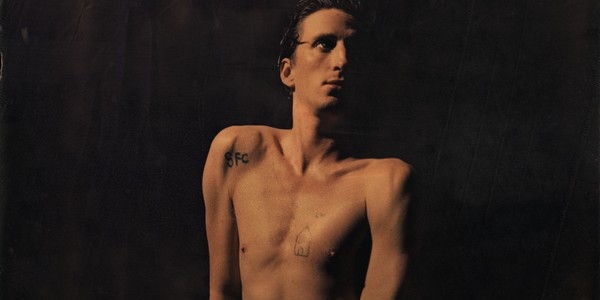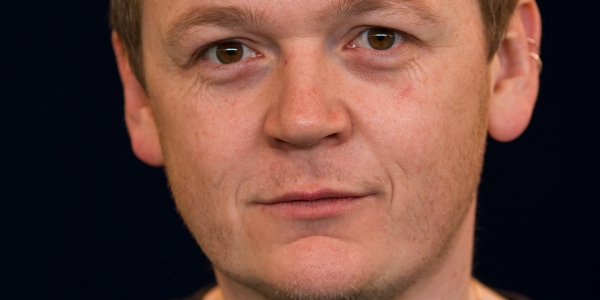The events of Sugar Mountain have been well documented since, with varying degrees of clarity. I assume Kirin doesn’t want to talk about it today. I could be wrong. The focus is on Embracism, a record that should have come out a long while ago, but the wait and delays proved to be beneficial. It’s a great album. Kirin, a man projecting the tense extremes of narcissism and insecurity through his art and performances, seems assured by the finished artefact.
“It’s a huge relief,” he states in a distinct, punchy baritone. “It’s exciting, it feels good. I’m already starting to hear the album through other people’s ears, so to speak. I look forward to its release proper, and to be able to share it with those who have been coming to shows for however long, or supported us in some capacity – even if it’s just been letting me sleep on a couch throughout these whole long process. I’m looking forward to sharing it with them, let alone the world at large. I’m happy to be letting go of any issues I’ve had with any songs. I’m also looking forward to starting on the new one.”
The album, recorded with The Presets’ Kim Moyes and mixed with Grizzly Bear’s Chris Taylor, features a measured dose of ten tracks – a few which have been workshopped in the live setting for years, some crafted there and then in the studio. “I recorded more than the ten, some of those will come out in time – whether its B-sides, bonus tracks, or exclusive things,” he reveals. “They’ll see the light of day. There was a real concern early on that, stylistically and thematically, there were a lot of different sentiments, a lot of different feelings being expressed, and a lot of different sounds. I guess I just wanted it to have a nice flow from start to finish, sequencing was going to be very important, as well as the combination of songs. There were a bunch of other ballads that didn’t make the record, but I thought Landslide and Chardonnay Sean were the strongest. There were poppy songs that didn’t make it, but Victoria M. is holding down that place. I’d rather have more conceptual songs featured than traditional songs. It was kind of obvious, to be honest with you. It was obvious what songs were working and what the sequence should be. I put more thought into that than perhaps anything else.”
Two notable exceptions from the tracklisting are Thighs (which was released as a B-side to last year’s Way II War) and Bait & Wait. I raise the point that these songs both contain explicit sexual overtones, something that isn’t necessarily present throughout Embracism. “The sexual thing had nothing to do with it, there were no concerns from anyone,” he reasons. “Bait & Wait, we recorded it, and it’s one of the songs that will come out as a B-Side or a bonus track. It’s probably my favourite track out of all the recordings,” Kirin reveals. “The decision to leave it off the album was largely in terms of flow. With Thighs, me and Kim experimented with it and explored it, but I’ve already released a version of it. It’s came into its own life, and I was happy to leave it at that and move on to new ballads. I didn’t actually finish a new recording of that one, but I’m happy with that.”
The version of Way II War present on the album has evolved slightly from the version released as a single in 2012. Last year’s version featured exclusively garbled vocals, with the lyrics barely discernable within the mix. The album version is much the same, except this time the outgoing verse is garnished with a clear cry of “Nobody knows, nobody knows/So get over it” high in the mix. It’s a tidy charting of Kirin’s growth and comfort as a singer. “My favourite singers and vocalists are up the front, commanding their space and instruments high in the mix with clarity in the lyrics. Kim pushed me into that space, just to get that out of me. As a solo artist, it’s kind of important,” he laughs “Way II War was a bit of an anomaly, just something I did at home. It was nothing more than a demo, really. A late night, early morning vocal performance where I was feeling how I sounded. It was a strange night, that one. The ending, it hadn’t really occurred to me why there weren’t vocals at the end. After having some time away from it, I realised that riff at the end was calling for a vocal. So we just went in a did it, I haven’t thought about it like that – about it being me becoming a more confident singer. But it’s entirely true, and that sums it up to a tee.”
Embracism projects vivid depictions of the landscape, from the rough and tumble playground of the title track through to the earthly and oceanic natural beauty on Landslide. The employment of landscape within the narrative holds up as one of the distinctly Australian characteristics present on the record. “I think the Australian thing for me has been about the lyrical content, vocal delivery and the guitar sounds,” Kirin assesses. “But that’s a nice idea, that it’s a uniquely Australian thing to evoke the landscape in a musical setting. I don’t think about it too much. It’s natural, I am Australian, I’ve spent my whole life in Australia. If it’s not autobiographical, it’s personal. So it would makes sense that it has that flavour. It’s never been deliberate to sound more Australian, it just feels right.”
Kirin is speaking from New York on the cusp of a tour supporting Ariel Pink across America. The country is the topic of the sardonic, brutally industrial ode Come On USA. Kirin plans to play it at every US performance. “Even in America there is a lot of disdain and sadness for the state of the nation, for the state of the American dream that’s been sold. I’m yet to encounter any anger, but I have only been playing in LA and New York. Maybe taking it to Bumfuck, Nowhere in the southern states might result in a different experience,” he envisions. “But I doubt I’ll encounter that touring with Ariel Pink. But you never know. I actually plan to release the song over here on July 4, Independence Day, possibly accompanied by some sort of flag-waving video.”
One of the most arresting aspects of Kirin’s oeuvre, particularly present on Embracism’s title track, is an overt, amplified masculinity – reaching Ben Hur-levels of homoerotic undertones. “I don’t want to get too heavy with it, but it’s a physically intuitive thing to express myself and my masculinity. As a songwriter, I’m trying to write about things I’m experiencing and dealing with first hand,” he rationalises. “That’s one aspect of it, and no one else has really talked about it that much, which is probably why I gravitate towards it. Those ideas seem to get through the filter, where a lot of lyrics and ideas don’t. It’s exciting for me, really exploring these uncharted waters. More and more in my own life I’ve – excuse my use of the term – embraced my masculinity. I’ve explored my feminine side a lot as well, especially when I was a bit younger where I used to cross-dress a bit – not just onstage, but in my own life. That certainly stirred my more effeminate nature. It’s a snapshot of where I am personally as well, as a man, as a single man. A lot of the record has come from a place of heartache and breakup, the angry space I was in. I didn’t realise how angry the record was until recently hearing it back after spending some time away from it.”
I inform Kirin that our allotted 20 minutes are up. He says we can squeeze one more question in, perhaps an offer to talk about the Sugar Mountain-sized elephant in the room. I ask about You Like It, I Love It, a short film Kirin starred in last year, and whether it signifies the beginnings of a fully-fledged acting career. “That was kind of an off the cuff thing where the director [James Vaughn] came to a show and asked if I wanted to do it. I didn’t get back to him until a few days before the shoot, and I think the director was going to play the role himself. It was an incredible experience, I’d love to do more of it. I don’t want to do this music thing forever, parading around onstage, blowing my hearing out, making a fool of myself. I’d like to grow old with a little bit of dignity,” he muses. “I’ll maybe make three or four records, a couple of bad ones, then do a bit of acting. I’ll take it as it comes.”
BY LACHLAN KANONIUK

